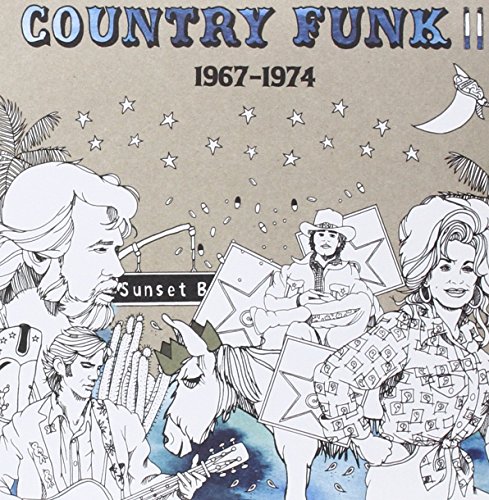
Various Artists
Country Funk II: 1967-1974
Release Date: Jul 15, 2014
Genre(s): R&B, Soul, Country, Funk, Progressive Country, Country Soul
Record label: Light in the Attic Records
Music Critic Score
How the Music Critic Score works
Buy Country Funk II: 1967-1974 from Amazon
Album Review: Country Funk II: 1967-1974 by Various Artists
Excellent, Based on 7 Critics
Based on rating 8.5/10
What do - to pick two stars of Country Funk 2 at more or less random - Willie Nelson and Bobby Darin have in common? On surface, very little. The Nashville reject turned successful author of bluer-than-Blues-itself ballads (“Crazy”, “Night Life” et al.) and the popular crooner behind such evergreens as “Mack The Knife” and “Dream Lover” were normally poles apart artistically. At a certain point in the 70’s, however, both were found sporting Stetsons, dishing out plenty of questionable attitude and straddling the type of fat and funky grooves that would be equally at home amidst the cowpats of the country and the whisky-stained temptations that go with the bright lights of the big city.
Based on rating 4/5
Most of us recall whiter-than- white Bobby Darin crooning from somewhere beyond the sea – but Christ, how far did that tide carry him? Back on dry land in 1969, he’s long-haired and pot-smoking, riding a funky bass and getting hassled by the fuzz on Me And Mr Hohner. It cuts a groove like a lathe and should have been a contender for the Easy Rider soundtrack, but probably wasn’t because, you know, who’d believe Bobby Darin could sound so hip? This second LITA collection of Southern-fried chicken grease (unified under the utterly made-up “country funk” banner) is full of such surprises. Larry Williams, Johnny ‘Guitar’ Watson and The Kaleidoscope hook up for some psychedelic sitar grooves you thought you’d never hear; Jim Ford’s Rising Sign is a fuzzy swamp-funk-rock beast that pummels you into submission.
Based on rating 8/10
Country funk isn't a real genre, except retrospectively, being one of those kinds of sounds you can't really explain but you sure know it when you hear it. That's the road map compiler Zach Cowie used for the first volume in this series, and it's the same one he uses here for the second volume. Yeah, it's country, but it's extra greasy, with pronounced backbeats, and it's, well, funky somehow.
Based on rating 8/10
The first Country Funk: 1969-1975 came out on noted reissue label Light In The Attic in 2012, and featured such artists as Bobby Charles, Tony Joe White, Mac Davis and Bobby Gentry. Response was strong enough to justify a sequel, and it's a damn entertaining one. This ain't funk in the George Clinton/James Brown sense, but the country music of this fertile period did incorporate soul, r 'n b and blues styles, to winning effect (unlike today's country, which draws on banal elements of rock and pop).
Based on rating 7.6/10
The term “country” was first applied to music in the 1940s as a substitute for the pejorative label “hillbilly,” and it has since been used to describe everything from the Carter Family’s mountain hymnal to Florida Georgia Line’s hip-hop-inflected radio hits. “Funk” has a similarly long history in pop music—a piece of Jazz Age slang that would eventually describe Parliament/Funkadelic’s mothership jams, Death Grips’ industrial beats, and nearly everything in between. Even among broad genre tags, both “country” and “funk” are incredibly elastic terms.
Opinion: Excellent
A follow-up to 2012’s “Country Funk 1969-1975,” this second anthology from Light in the Attic Records captures a seemingly disparate collision of cultures: country heartache and twang and the grit and swagger of funk and soul. There are all sorts of jaw-dropping moments, starting with Billy Swan’s otherworldly take on Elvis Presley’s “Don’t Be Cruel. ” Townes Van Zandt gets groovy and psychedelic on “Hunger Child Blues,” Willie Nelson sings about how “Shotgun Willie sits around in his underwear,” and Jackie DeShannon detours to Muscle Shoals on “The Weight.
Opinion: Excellent
Boasting such heavy hitters as Willie Nelson, Jackie DeShannon, Dolly Parton, JJ Cale and Kenny Rogers, Light In The Attic’s second Country Funk volume isn’t as compelling as the flawless first volume (released in 2012), but it’s only slightly less so. BLURT described the former—which included the legendary likes of Tony Joe White, Bobby Charles, Dale Hawkins, Link Wray and Bobbie Gentry—as providing “an invaluable service by introducing a key musical time, place and sound to a new generation of acolytes…. when it comes to music like this, feel is everything, analysis secondary [and] when the record’s done, you might not necessarily be able to define country funk, but you’ll sure recognize it when you hear it in the future.
'Country Funk II: 1967-1974'
is available now

